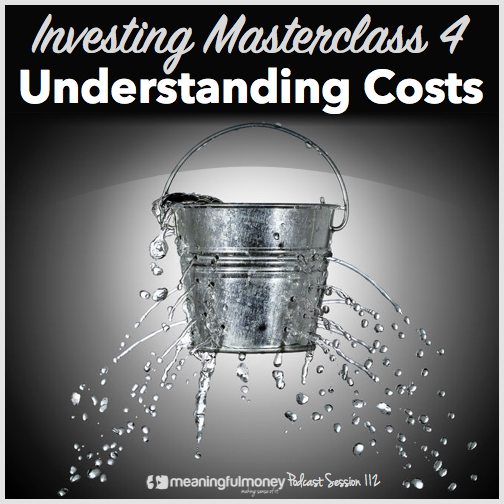 Continuing our investment masterclass, this week we’re talking about understanding costs. Every pound spent in costs as you go along your investing journey, is a pound which isn’t compounding for your benefit. So we need to know what costs you’re likely to incur, and then what you can do to keep them to a minimum. Stay tuned…
Continuing our investment masterclass, this week we’re talking about understanding costs. Every pound spent in costs as you go along your investing journey, is a pound which isn’t compounding for your benefit. So we need to know what costs you’re likely to incur, and then what you can do to keep them to a minimum. Stay tuned…
Don’t forget that MeaningfulUniversity is now open for enrolment. There is just one course on there at the moment; Learn How To Budget. More courses will follow, but LHTB will give you everything you need to KNOW and everything you need to DO to set and stick to a monthly budget. Check it out at meaningfuluniversity.com.
Podcast: Subscribe in iTunes | Play in new window | Download
If this show is of any use to you, it would help me massively if you would take the time to leave me a review on iTunes. This has a huge impact on keeping me near the top of the rankings, which in turns helps more people to find the show and to subscribe. I’ll remind you again at the end of the show, but if you want to do it right now, just click the button below:
Sponsor Message
 This podcast is brought to you with the help of Seven Investment Management, a firm of investment managers based in London. They specialise in multi-asset investing, bringing institutional investing techniques to ordinary people like you and me. 7IM put their name to my show and to my site because they believe in what I’m doing, trying to get decent, easy-to-understand financial information out to the world. I’m very grateful to them for their support.
This podcast is brought to you with the help of Seven Investment Management, a firm of investment managers based in London. They specialise in multi-asset investing, bringing institutional investing techniques to ordinary people like you and me. 7IM put their name to my show and to my site because they believe in what I’m doing, trying to get decent, easy-to-understand financial information out to the world. I’m very grateful to them for their support.
You can see what they’re up to at 7im.co.uk
Introduction
No-one minds paying for stuff as long as they are getting value for money. I remember my dentist once apologising for the cost of sorting the root canal work that was the source of a great deal of pain. I said I would mortgage my house to him if he just got rid of the pain! Fortunately, he didn’t take me up on that!
The point is that I would have paid five times the price of the root canal work, just to get out of pain. It was totally worth it.
It’s the same with investing – there are plenty of opportunities to spend money on stuff as you go along – but it must be worth it. Let’s look at how it all works and what you can do to keep value high, and the rip-offs to a minimum…
Everything you need to KNOW
1 – There are different levels, or layers of cost
Investing happens at different levels:
- Fund
- Wrapper
- Platform
- Advice
Each level has costs. Let’s look at each:
2 – Fund Costs
Funds generally have different ways of describing the costs they charge:
AMC – Annual Management Charge
TER – Total Expense Ratio (not total, and not a ratio)
OCF – Ongoing Fund Charges (That’s OFC not OCF! Ongoing Charges Figure?)
Ignore AMC, as it isn’t used very much any more. Any fund now has to provide a KIID (Key Investor Information Document) which shows the OCF. This used to be the TER, but the regulator deemed it be confusing, not least because it used the world total when it isn’t total.
The OCF seems to make more sense, and it doesn’t claim to be total. For instance it misses out:
- Performance fees – not usually an issue in most funds
- Entry and exit charges
- Trading costs – fees your fund pays to brokers to buy and sell stuff
- Stamp duty – a tax on trading UK shares
You’ll have to dig deep into the prospectus and annual accounts of any fund you invest in. But who’s going to do that? No-one I know does.
3 – Wrapper Costs
Wrappers = Pensions, ISAs, Investment Bonds etc. They are differentiated by tax treatment, primarily, and each will have a cost.
Platforms (more in a minute) will sometimes offer the more basic of these wrappers for no extra cost than the platform cost. Some pensions and investment bonds usually do have costs.
Look for:
- Policy fees
- Entry/exit costs
- Early surrender charges
- Quarterly admin charges
- Custody charges
- Trustee charges
Generally the more complex the wrapper, the more charges you’re likely to get. So an offshore bond with a trust wrapped around it and external investments within it, will have several layers of charges.
This is why I like to keep my tax wrappers simple, which is good enough for most people.
4 – Platform Costs
Platforms are admin systems on which you can hold different types of wrapper. They make life easier in many ways, but, you’ve guessed it, they come at a price.
Most are percentage prices, e.g. 0.3% per year of the assets held on the platform. Some platforms have other costs for trading, extra reports etc.
Ask yourself is the ease of admin and reporting that comes form using a platform worth the cost? It is a simple service – do you think n it is worth paying for?
5 – Advice Costs
Advisers cost money. Their value can sometimes be quantified, but not always. Clients tell me they value the relationship and peace of mind I bring to the party – that’s tough to put a figure on. Conversely if I save a client £250,000 in tax, they’re going to pay me fee for doing so.
Lots of ways advisers charge:
- Ad valorem, i.e. a percentage of the assets they manage for you
- Hourly rates
- Monthly or annual retainers
No problem with any of these, as long as you’re getting value.
6 – Tax is a charge
Duh – obviously!
But I’m serious, some people think tax is necessary evil, but there are many taxes that are avoidable, legitimately.
Sometimes avoiding tax costs more in product charges, so you’re in a negative position. Had an example recently for a trust I am advising. They could avoid tax of £700 by paying product charges of £2,600 – what would you do?! Pay the tax!
Most people don’t mind paying tax which is due, but they don’t want to pay more than they have to.
Everything you need to DO
1 – Know your charges
Spend some time detailing what charges you are paying currently; ask the companies you are investing with for detail. Do this at each level – fund, wrapper, platform.
They’ll mostly be expressed as a percentage – find out what this means in pounds and pence – much more real.
Add it up across your different holdings
Try not to swear.
2 – Consider simplification
Sometimes consolidation can save you money. Old policies can be costly, but weigh possible cost savings against loss of benefits, e.g. Pensions – seek advice if unsure
3 – Use tax allowances
- ISA – £15,240 per person
- Pension – 100% of your earned income, up to £40,000 max
These will be enough for most people. For advanced investors, consider EISs and VCTs – check out session 81 of more on those.
4 – Demand value at each level
Look carefully at the costs you are paying – are you getting value?
Fund: if you are paying fund managers – active investment funds – are they producing performance that more than justifies the cost? If not, go passive. Review this each year at least
Wrapper: consider more modern plans which are generally lower cost, but not always. Again, check for loss of benefits before ditching old plans too quickly -seek advice
Platform: Simple service – if it’s of value, you’ll pay, if not, then don’t. If your affairs are simple, then you probably don’t need a platform. But if your affairs are simple, then basic platform accounts like ISAs and pensions don’t cost you anything anyway.
Advice: Sometimes the touch-feely benefits of having an adviser are tough to quantify, but only you can know if you think your adviser is worth the money you’re paying them.
Summary
It’s so easy to lose track of costs, but we tend to but effort into squeezing an extra percent of performance out, and ignore the costs which are often hidden or at best, not very obvious.
Take the time to audit your portfolio for costs and get to the bottom of what you’re paying to whom and for what. Demand value; it’s your money and you should make sure it is working hard for you, not lining someone else’s pockets.
That’s pretty much it for the Investing Masterclass series I think. We’ve looked at Asset Allocation, Risk, Behavioural Finance, Setting Targets and understanding Costs. If you think there’s anything else I should be covering let me know in the comments section.
Don’t forget, a full transcript of this entire episode is available if you hit the button below:
Resources
Session 67 – Shares vs Funds: The Grudge Match
Session 81 – Advanced Investing, EISs and VCTs
Reviews
Lots of reviews this week because I put a shout out for them after my chat with Carl Richard in Session 110. The first three to leave reviews for the first time after the call out were: xxcatcatcatxx, Dxt00018 and Beechmeister General.
Please drop me an email at pete@meaningfulmoney.tv and let me know if that is you and I’ll arrange to send the Carl Richards book to you!





Leave a Reply